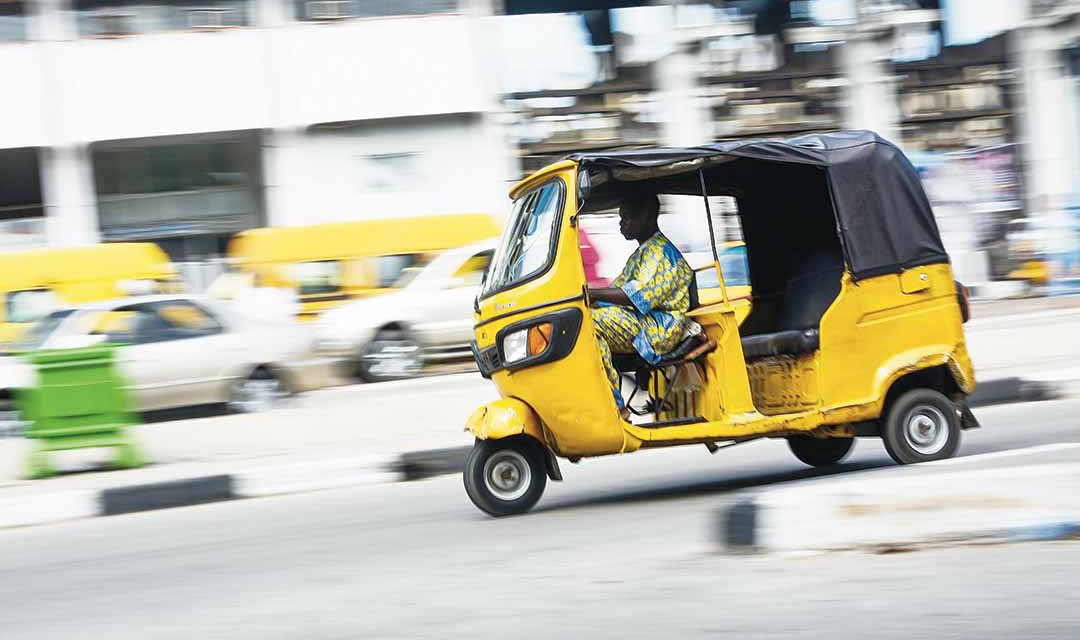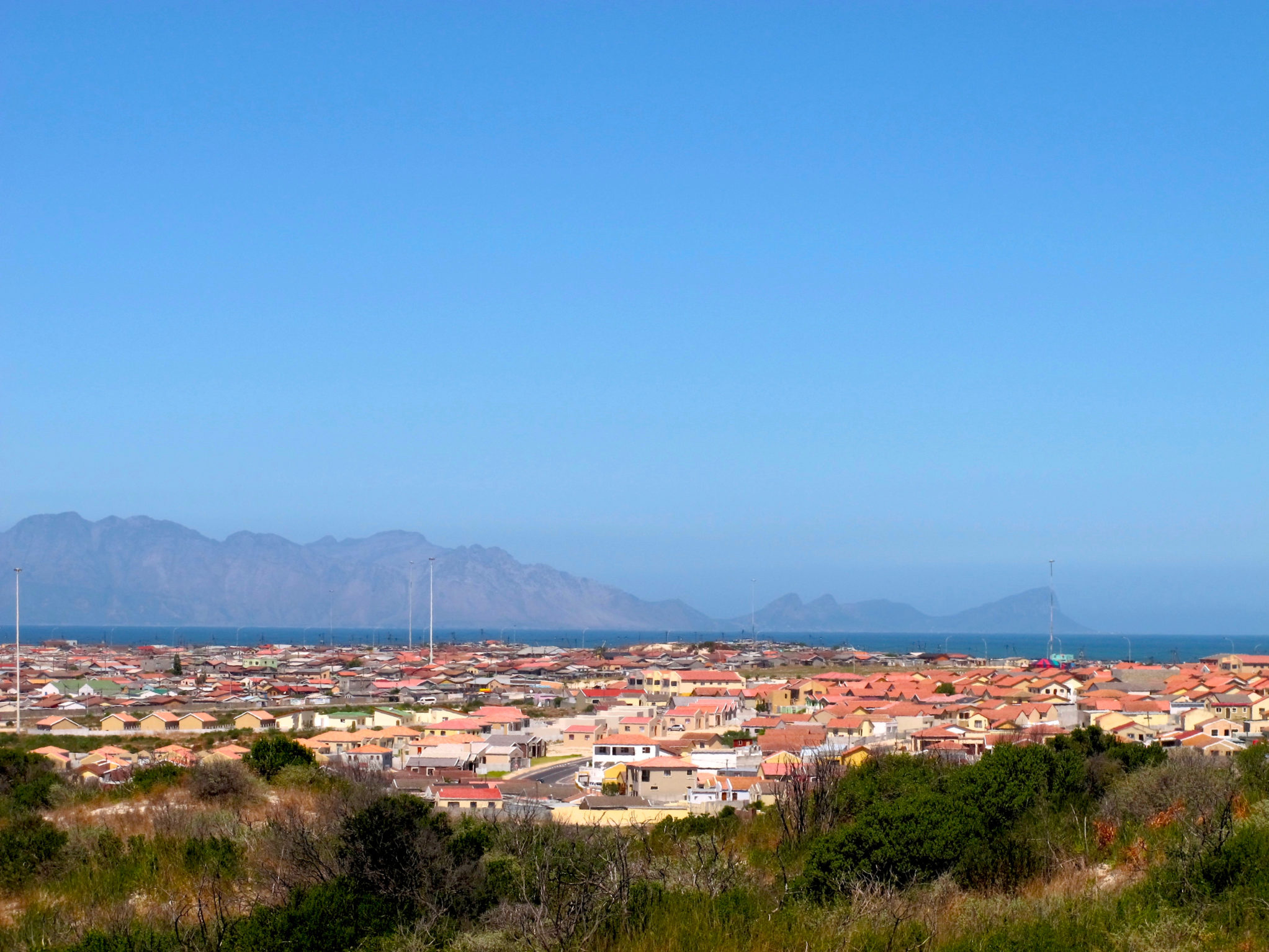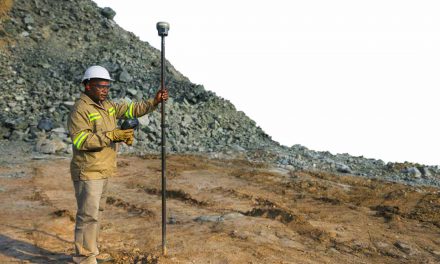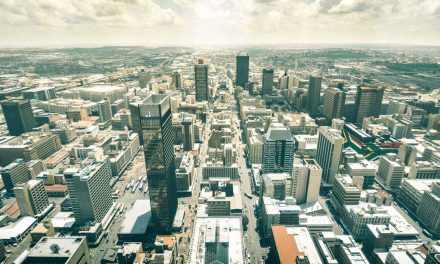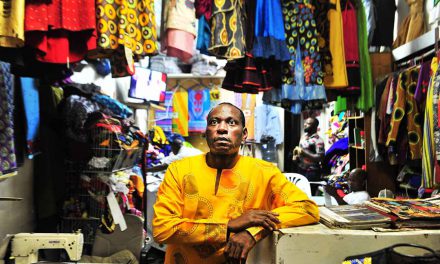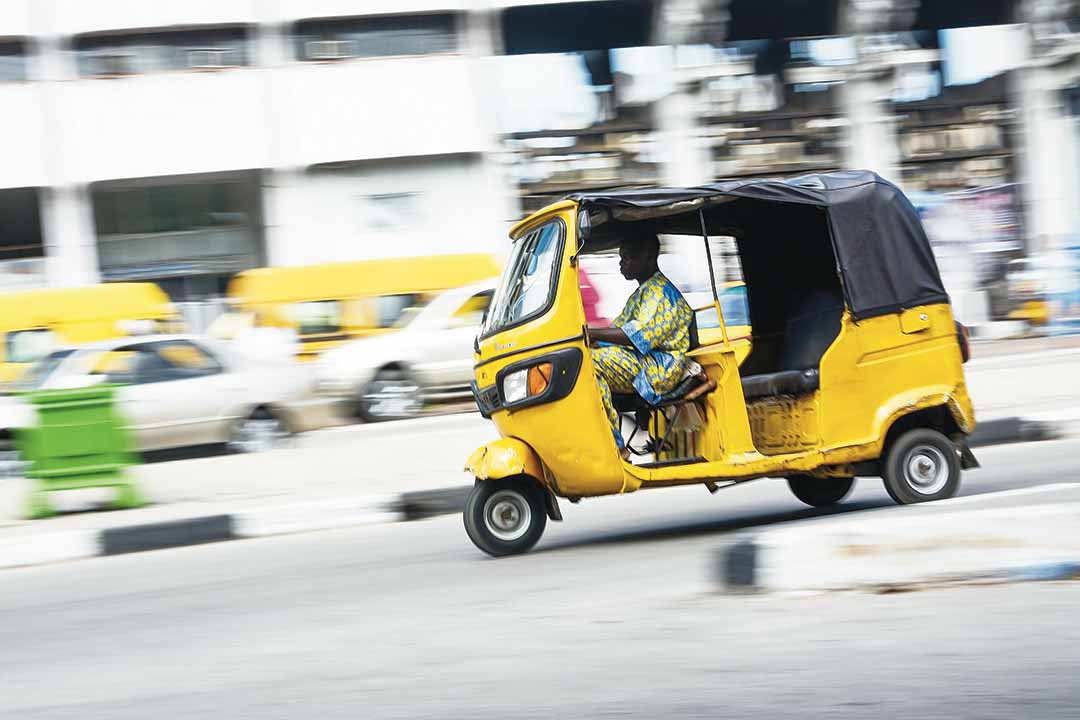
A tuk tuk driver in Lagos Photo: Olasunkanmi Ariyo
Lagos is arguably the most challenging Nigerian state to run, but it is also the most attractive in which to run for governor
“Wherever you are in this country, in fact on this continent, there’s no place like Lagos,” says Seun Olaniyi, a middle-aged engineer who has recently relocated from Nigeria’s commercial capital to Abuja, the federal capital. He doesn’t doubt that he will return to Lagos one day. For him, the question is “when, rather than whether”.
Meanwhile Chika Madu, a recent university graduate based in the ancient town of Nsukka in the south-east, has a different view. “I can never, ever live in your Lagos,” he says.
Their contradictory views reflect something of the spirit of the world’s 17th most populous city. A tale of ironies, Lagos is a confluence of affluence and indigence, of posh boardrooms and filthy open-air markets, and of calm blended with chaos. The city is loved as fierily as it is loathed.
With more than 21 million inhabitants, according to a 2016 estimate by the National Population Commission, Lagos has the largest population of any Nigerian state, and is the most profitable place to run a business in the west African country. Its citizens are enthusiastic consumers who represent a potentially massive market. But the sheer size of the population is also responsible for its maddeningly heavy traffic. Driving through Lagos, particularly at peak hours, is a lesson in patience and endurance.
Administratively, Lagos is unarguably the most difficult Nigerian state to run. Unsurprisingly, this is again down to its sheer population. Yet, given Nigeria’s money-dominant politics, Lagos is also the most attractive state in which to run for governor.
Let’s substantiate the former. Although the city allocated N4.1 billion ($1.3 million) in 2017 for “streetlight maintenance and rehabilitation” as part of the “Light Up Lagos” project, according to a December 2017 report by the International Centre for Investigative Reporting, darkness pervades the streets at night. No doubt, corruption and kickbacks will have weakened contractors’ ability to supply standard materials. To light an area measuring 1,171.28 km2 with a population density of 6,871 km2 would have been no mean feat.
Lagos is one of only two of Nigeria’s 36 states — the other is Ogun — that can manage without crude oil-powered federal pampering in the form of Federation Account Allocation Committee (FAAC) handouts. In effect, the city state receives far less from government than it generates itself. While Ogun generates 75.9% of its total revenue internally, Lagos self-generates 78.33% — the highest in the country, according to the 2017 State of States report by BudgIT, an independent civil-society organisation. Just for context, Osun is next, with a distant 53.91%. Even that figure is due to huge debt deductions from Osun’s FAAC allocations, rather than high levels of Internally Generated Revenue (IGR), according to the same BudgIT report.
Lagos is Nigeria’s undisputed economic hub. While other states are prospecting for the 2018 fiscal year in billions, Lagos is talking trillions. Its N1.046 trillion ($3.4 billion) 2018 budget is equivalent to the sum of the 2018 budgets of the other five states in the south-west: Oyo, N265 billion ($868.9 million), Ogun, N345 billion ($1.1 billion); Osun, N173 billion ($567.2 million); Ekiti, N96 billion ($314.7 million) and Ondo, N171 billion ($473.7 million), according to BudgIT.
But, financially speaking, the Lagos state government is notoriously opaque. Nowhere on the state’s official website is there any concrete information about the city’s funding and expenditure patterns (the BudgIT numbers mentioned earlier were independently researched). Inquiries in the form of letters — either from tax-paying citizens seeking to know how their sweat is being used by the government or by journalists seeking information in the larger public interest — are ignored.
The administration of the current governor, Akinwunmi Ambode, appears to be continuing the financial opacity practised by his predecessor, Babatunde Fashola. Only months after Fashola left office in May 2015, for instance, it was revealed that he had spent a whopping N78.3 million ($256,721) of taxpayers’ money on the “upgrade” of a website documenting his activities as governor. IT experts have estimated that the project should have cost no more than between N300,000 ($983.6) and N3 million ($9,836).
In Lagos, the citizens are on their own — unless, of course, their specific plight is something the government is interested in for reasons of its own. The Ambode administration has succeeded in reducing traffic congestion by constructing ingenious lay-bys on busy roads and repairing potholes. But such road repairs have concentrated on the city’s major roads. In Ikorodu, in the north-eastern part of the city, for instance, there is an abundance of bad roads. One, a long stretch of undulating, rocky and untarred road in Igbo-Olomu, in the Agric area of Ikorodu, is starving the local community of business opportunities and making it an unattractive place to live.
“This road has been bad for more than 10 years,” says Greg Ugo Agba, a landlord who has lived in the area for decades. “We have been crying out for years but no one seems to listen. We’ve screamed, written letters, given interviews (to media), but the government seems not to take notice of us.”
A passing motorcycle taxi rider, who asked not to be named, suggested that the bad road was a health hazard. “You can see for yourself that this road is terrible; look at the riders and even passengers wearing nose masks to insulate themselves against dust. Those who are not wearing them are exposing themselves to various debilitating health conditions, chief among which is asthma,” he said.
He also linked the state of the road to crime. Conditions worsen when the rains come in late February to early March, making the road even more difficult to navigate. “Passengers ignore us and walk to the junction instead,” he said. Deprived of their livelihoods during that time, he added, many riders resorted to crime.
This writer’s attempt to bring the state of this road to the notice of the government turned out to be futile. The procedure alone was daunting.
At the Lagos State Secretariat, the seat of government in the state, in Alausa, Ikeja, I was told that I could only notify the governor about the bad road in “a letter to His Excellency”, addressed through his chief of staff, Samuel Ojo. The letter would have to be submitted not at the secretariat but at Lagos House, which is located in a part of Ikeja that is out of bounds to public transport. Secretariat staff insisted that they could not collect the letter and pass it on to Lagos House. For private citizens not rich enough to own a car, the implication is a 20-minute walk from the secretariat to Lagos House.
On January 5, just before 4pm, I found the office of the governor’s chief of staff open, but it appeared that no staff were at work. It was Friday, the security men at the gate explained. “We close at 3.30pm, not 4pm,” one added. “If your letter is really important, come back on Monday.”
I repeated the two-hour journey from Igbo-Olomu to Alausa the following Monday morning. This time, a robustly built official collected the letter, but asked for “something for the weekend” in exchange for handling it.
An official demanding cash from a citizen who wants to alert the city government to an urgent need for repairs to a certain road? Vintage Lagos! The government doesn’t really care about the people, and the people don’t really care about the government. Nor do they care much about one another, for that matter. Everyone is too busy trying to make money. As a result, this legitimate aspiration often takes an illegitimate course — like that of the official at the office of the governor’s chief of staff.
Meanwhile, one month on, the writer of the letter hasn’t received a reply from the government as promised by the official, who reluctantly agreed to accept it without payment. Back in Igbo-Olomu, everyone knew that the reply would never come.
Fisayo Soyombo (@fisayosoyombo) is former editor of The Cable, a Nigerian news outlet, and of the International Centre for Investigative Reporting (ICIR), as well as a former managing editor of Sahara Reporters. He has won multiple awards, including the Wole Soyinka Award for Investigative Reporting (three times). He has written for Al Jazeera, TAZ, Journal Du Dimanche, the Daily Mail UK, among other publications. His reporting has been translated into German, French and Arabic.

